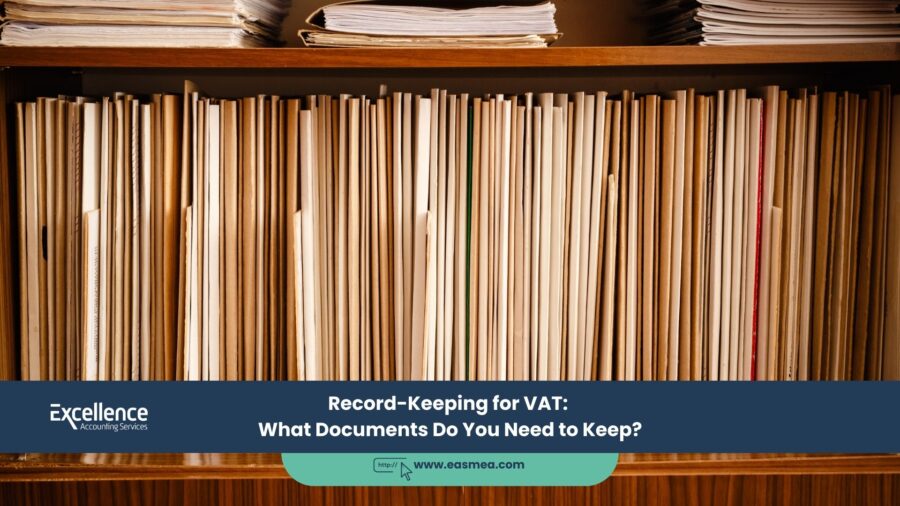A Guide to Record-Keeping for VAT: What Documents Do You Need to Keep?
Since the introduction of Value Added Tax (VAT) in the UAE, maintaining accurate and comprehensive records has transitioned from a good business practice to a strict legal obligation. The Federal Tax Authority (FTA) operates on the principle that if a transaction is not properly documented, it effectively didn’t happen for tax purposes. Your financial records are the primary evidence you have to support the figures you declare on your VAT return.
- A Guide to Record-Keeping for VAT: What Documents Do You Need to Keep?
- Why Proper Records are the Foundation of VAT Compliance
- The Essential Documents You Must Keep
- The 5-Year Retention Rule
- Build an Audit-Proof System with Excellence Accounting Services (EAS)
- Frequently Asked Questions (FAQs)
- Is Your Business Audit-Ready?
Failing to maintain the required documents can lead to a host of problems, including the disallowance of input tax claims, administrative penalties, and significant complications during a tax audit. For every business registered for VAT in the UAE, understanding exactly what records to keep, in what format, and for how long, is fundamental to compliance and risk management.
This guide provides a detailed overview of the mandatory record-keeping requirements under the UAE VAT Law. We will outline the specific documents you must maintain, the required retention period, and the importance of having a robust system in place to manage your compliance.
Key Takeaways
- The 5-Year Rule: You must keep all VAT-related records for a minimum of **five years** after the end of the tax period they relate to. For real estate, this period is extended to 15 years.
- Tax Invoices are Crucial: Maintaining a complete file of all tax invoices you issue (sales) and receive (purchases) is the most critical requirement for substantiating your VAT return.
- It’s More Than Just Invoices: The requirement extends to all books of account, including ledgers, purchase day books, and records of all goods and services supplied and received.
- Records Must Justify the Numbers: Your records must be sufficient to allow the FTA to verify the calculations on your VAT return.
- Penalties for Non-Compliance: The penalty for failing to keep the required records is **AED 10,000 for the first instance** and AED 20,000 for a repeat violation.
- Digital Records are Acceptable: You can keep records electronically, but they must be secure, accessible, and easily convertible into a readable format for the FTA. Robust accounting and bookkeeping systems are essential.
Why Proper Records are the Foundation of VAT Compliance
The UAE’s VAT system is a self-assessment system. You are responsible for calculating your output tax (on sales) and your input tax (on expenses) and declaring the net amount. The FTA relies on your records to audit and verify these calculations. Without proper documentation:
- You cannot prove your input tax claims: To reclaim the VAT you paid on a business expense, you must hold a valid tax invoice from your supplier. No invoice, no reclaim.
- You cannot verify your output tax calculations: Your records must support the total sales figures you declare on your return.
- You cannot defend yourself in an audit: If the FTA selects you for an audit, your records are your primary line of defense. A lack of organized records will immediately raise red flags.
In the eyes of the FTA, a transaction without a valid tax invoice is a claim without evidence.
The Essential Documents You Must Keep
The VAT law requires businesses to maintain a range of records to support their tax filings. While the specifics can vary by industry, the core requirements are universal.
| Record Category | Description and Key Documents |
|---|---|
| Records of Supplies and Imports | Copies of all tax invoices, tax credit notes, and other documents issued for all the goods and services you have supplied. This includes records of any goods and services exported. |
| Records of Expenses and Purchases | Originals of all tax invoices, tax credit notes, and other documents received for all goods and services you have purchased, including imports. This is essential for your input tax claims. |
| Books of Account | A comprehensive set of accounting records, including your general ledger, accounts payable and receivable ledgers, purchase day book, and records of all cash transactions. |
| Goods and Services Records | Records of all goods and services that were disposed of or used for non-business purposes, and any goods and services purchased for which you could not claim input tax. |
| VAT Return Records | Copies of all submitted VAT returns and all the calculation workings and reconciliations used to prepare them. |
The 5-Year Retention Rule
The standard rule is that all VAT records must be kept for a minimum of **five (5) years** after the end of the tax period to which they relate. For example, for a VAT return filed for the quarter ending 31 March 2024, you must keep all supporting records until at least 31 March 2029.
The Real Estate Exception: There is a crucial exception for businesses involved in real estate. For any real estate-related records, the retention period is extended to **15 years**.
This long retention period means you must have a secure and reliable system for storing your documents, whether you choose to keep physical copies or digital scans.
Build an Audit-Proof System with Excellence Accounting Services (EAS)
Maintaining compliant records doesn’t have to be a burden. With the right systems and expert support, it can become a seamless part of your operations. EAS provides end-to-end solutions for VAT compliance.
- Professional Accounting and Bookkeeping: We use modern cloud software like Zoho Books to ensure every transaction is recorded correctly and all digital documents are securely stored and organized, ready for inspection.
- VAT Return Filing: We manage your entire VAT return filing process, ensuring that every figure on your return is supported by the correct documentation.
- VAT Health Checks and Audit Support: Our VAT consultants can conduct a review of your record-keeping practices to identify any gaps. In the event of an FTA audit, we will prepare and manage your documentation to ensure a smooth process.
- Accounting System Implementation: We can help you set up a new accounting system that is designed for VAT compliance from day one.
Frequently Asked Questions (FAQs)
A valid tax invoice must contain specific information, including the words “Tax Invoice,” the supplier’s name, address, and TRN, the date of issue, a clear description of the goods/services, and a breakdown of the total amount showing the net value and the 5% VAT amount separately.
If you lose an invoice, you should immediately contact your supplier and request a copy. Without a valid tax invoice in your possession, you are technically not entitled to reclaim the input tax on that purchase. The FTA can disallow the claim if you cannot produce the invoice during an audit.
While you are not required to keep “VAT records” specifically, you are still required by other laws (like the Commercial Companies Law) to maintain proper financial records. It is also essential for monitoring your turnover to see if you are approaching the mandatory registration threshold of AED 375,000.
Yes, electronic record-keeping is perfectly acceptable. However, you must ensure the data is secure, backed up, and can be easily accessed and provided to the FTA in a readable format (like PDF) upon request.
You can keep your day-to-day records in English. However, the FTA has the right to request a translation of any document into Arabic at your expense. It is a good practice to have key documents available in both languages.
Disorganized records will immediately create a negative impression and will likely prolong the audit process. If you are unable to produce the documents required to support your claims in a timely manner, the FTA may disallow your input tax claims and issue penalties.
Yes. Any business that is registered for VAT, including those in Free Zones, must comply with all the record-keeping requirements of the UAE VAT Law.
Yes. If you are registered for VAT, you are subject to the exact same record-keeping rules as any other business, regardless of your size or legal structure.
The penalty for failing to issue a correct tax invoice or tax credit note is AED 5,000 for each instance.
The best way is to use a modern, FTA-accredited cloud accounting software (like Zoho Books) and engage a professional accounting firm. The software helps automate the process, and the professional service provides the expertise to ensure it’s done correctly.
Conclusion: The Foundation of Good Tax Practice
In the UAE’s tax landscape, good intentions are not enough. Compliance is built on a foundation of good evidence, and that evidence is your financial records. By embracing a disciplined and organized approach to record-keeping, you are not just fulfilling a legal obligation; you are safeguarding your business against risk, enabling better financial management, and ensuring you are always prepared for the scrutiny of the tax authorities.
Is Your Business Audit-Ready?
Contact Excellence Accounting Services for a professional review of your accounting and VAT record-keeping systems.




